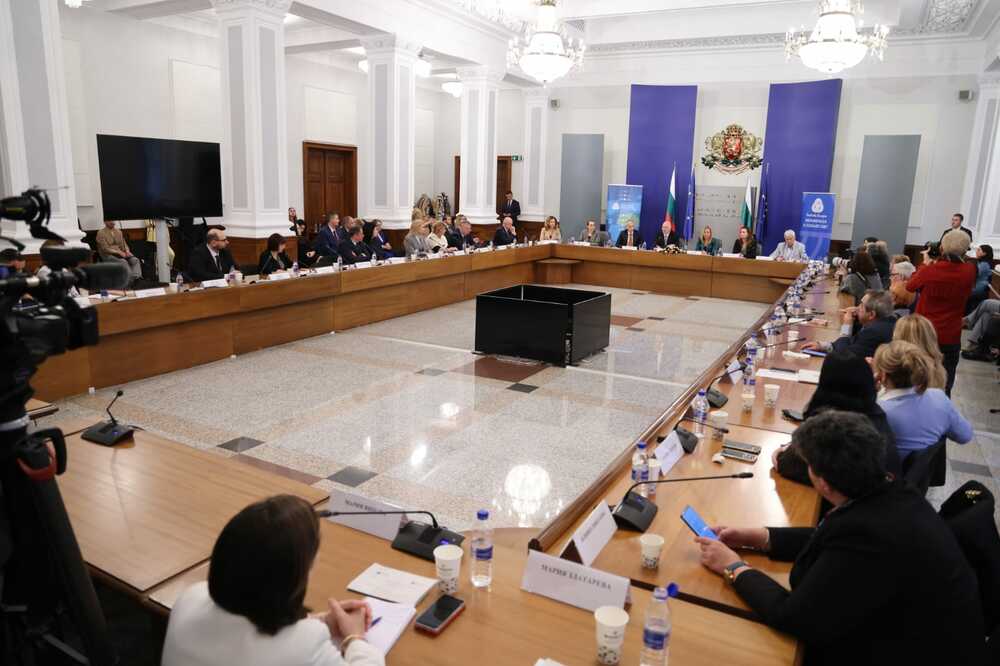site.btaEurozone Membership: Benefits and Risks for the Public Discussed at National Forum in Sofia


The benefits and potential risks for the public of introducing the euro in Bulgaria were discussed on Friday by representatives of various institutions and experts during the national forum The Effect of the Eurozone: Lessons from Member States, held at the Council of Ministers.
The event was organized by the Economic and Social Council of Bulgaria and forms part of the Communication Strategy for introducing the single European currency in Bulgaria.
Deputy Interior Minister Filip Popov noted that, at the international level, the Ministry of Interior is actively participating in a number of coordinated initiatives and operational meetings with representatives of partner institutions from European Union member states as well as with key international organizations. He said that a major focus of this cooperation is the exchange of information, best practices, and analyses related to trends and emerging threats in the field of currency counterfeiting.
Popov explained that, regarding logistics and security for transporting and distributing euro banknotes and coins, the Ministry of Interior collaborates closely with the Bulgarian National Bank and the security services of the European Central Bank. According to the established plan, monthly meetings are held at both national and local levels with representatives of banking institutions. In coordination with the Bulgarian National Bank, security measures are implemented for facilities and the secure transport of cash within the country.
Ivaylo Ivanov, Governor of the National Social Security Institute (NSSI), emphasized that the transition from the lev to the euro must be carried out with as little difficulty as possible for social security system clients. Ivanov assured that the more favourable rules for recalculating pensions will be applied.
We have already adapted our information systems to accommodate this change. With the decrees updating pensions by 8.6% effective July 1, 2025, all pension amounts will be recalculated and displayed in euros. This will give individuals a six-month period to familiarize themselves with the new amounts and know precisely what their pension will be in euros in 2026, when payments will be made exclusively in euros.
Ivanov noted that approximately 40% of pensioners do not receive their pensions via bank transfers and assured that they will continue to receive their pensions in euro without any disruption. He confirmed that all social payments will be delivered to recipients on time and in full, even after the currency transition.
Deputy Executive Director of Bulgarian Posts Stanimir Belinov announced, "We have organized an information campaign, as our currency exchange services from leva to euro will be offered in smaller communities where bank branches are unavailable."
Lydia Shouleva, member of the Managing Board of the Council of Women in Business in Bulgaria and member of the Economic and Social Council, pointed out that one of the most widespread rumours is that after January 2026, leva will be exchanged at a rate of 1 to 3, instead of at the fixed rate. Shouleva said that this rumour had forced many people to exchange their money prematurely, resulting in considerable losses. She explained that these losses occur because, after Bulgaria enters the eurozone, the money in bank accounts will be converted automatically.
Shouleva also drew attention to the elderly, who keep a large part of their savings at home. She urged them to deposit these funds in banks, where the money will be automatically converted after January 1, 2026. Shouleva added that another widespread rumour is that loan interest rates will change after eurozone entry. She said these rates will remain at their current levels.
/RY/
Additional
news.modal.image.header
news.modal.image.text
news.modal.download.header
news.modal.download.text
news.modal.header
news.modal.text































